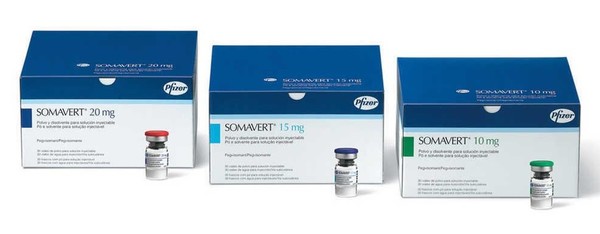Pfizer Korea said Thursday that the Ministry of Health and Welfare would begin to reimburse Somavert, its acromegaly treatment, from this month.

According to the current standard, the health authorities reimburse Somarvert to patients over 18 with acromegaly who have received surgery and radiation therapy but do not respond adequately after receiving treatment with Octreotide 30mg or Lanreotide 120mg for at least 24 weeks and have an insulin-like growth factor 1 (IGF-1) 1.3 times or more of the upper limit of normal (ULN).
With the reimbursement, patients will have to pay 64,166 won ($55.36) for 10mg vial, 93,041 won for 15mg vial, 121,915 won for 20mg vial, 150,790 won for 25mg vial, and 179,665 won for 30mg vial.
The ministry based its approval on ACROSTUDY, a large-scale long-term follow-up registry study designed to confirm the long-term efficacy and safety of Somarvert in 2,090 acromegaly patients in 15 countries.
In a follow-up study for 12 years, the company confirmed that 89 percent of patients exceeded the ULN for IGF-1 at the start of the study. However, the share of patients with normal IGF-1 levels after administration of Somarvert, which was 53 percent during their first year, increased 73 percent after a decade.
Also, as a result of an analysis of 1,702 patients with acromegaly after administration of Somarvert, the company confirmed there was no change in tumor size in 72.2 percent of patients, and tumor size decreased in 16.8 percent of patients.
Notably, the company saw that the size of the tumor increased and decreased at the same time in 4.3 percent of the patients, and only 6.8% percent of the patients showed an increase in the size of their tumors.
The company stressed that they expect the reimbursement of Somarvert to provide a new opportunity for patients who need to switch treatment as the reimbursement standard for the drug is more relaxed than that for the existing second-line therapy for acromegaly.
So far, patients with acromegaly who need a secondary treatment option that failed to control their symptoms with a somatostatin analog had to satisfy both growth hormone (GH) and IGF-1 levels to be eligible for reimbursement from secondary therapy, it added.
“Acromegaly is a chronic, progressive, rare disease that, if not properly treated, reduces life expectancy along with various systemic complications,” said Kim Hee-jeong, Pfizer Korea’s rare disease business unit lead. “In a situation where there was a limit in treatment options, it was difficult to switch treatment due to the strict reimbursement standards for the existing second-line treatment.”
Therefore, the company is happy to provide a new treatment option that has confirmed its safety, Kim added.

